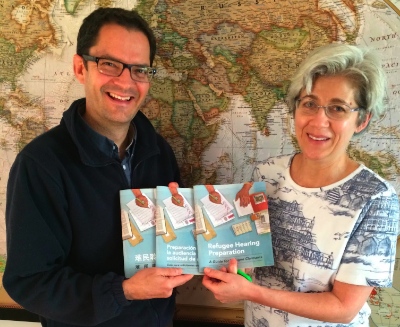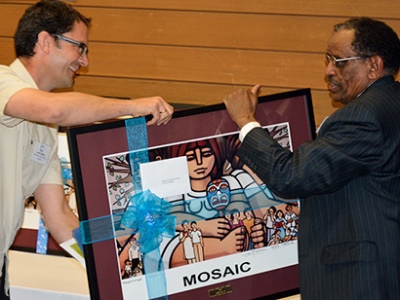Kinbrace, a refugee housing and support agency with Christian roots, has been recognized with the MOSAIC 2014 Human Rights Award.
The award particularly cited Kinbrace’s work in developing a series of published resources under the title of Refugee Hearing Preparation Guide. The booklets appear in several languages and are now being distributed in Vancouver, Winnipeg, Montreal and Toronto, where 90 percent of ‘inland” refugees are located. (Inland refugees are those already in Canada, awaiting hearings.)
Explaining the award, Kinbrace director Loren Balisky said MOSAIC is a large Vancouver-based settlement organization. “We [Kinbrace] have partnered with them in settlement of refugees in the Commercial Drive area.”
In a comment on the Kinbrace website, Loren said:
When awards are handed out, we look for the heroes. . . . Here are the Kinbrace heroes this Human Rights Award honours: people who have been forced from their countries of origin because of their human rights work and are now settling in Canada, Kinbrace staff and volunteers, financial donors, lawyers, partner agencies across Canada, doctors, social workers, government civil servants who understand the importance of Canada’s refugee protection system and work to make it work, communities of prayer, children at Kinbrace and all around us who have a remarkable capacity to welcome without judgment, and many others.
The idea behind Kinbrace originated in 1998, when Hawthorne Charitable Foundation acquired two homes in the Commercial Drive area, in partnership with Grandview Calvary Baptist Church. (Hawthorne was set up by the late Shirley and Howard Bentall; the Bentalls were part of the Bentall construction family for which the five downtown Bentall Towers are named.) The houses were used to settle refugees who needed short-term housing.
Fast forward: Kinbrace set up as charity in 2012, separate from Grandview Calvary and its Salsbury Community Society. It has emerged as the agency that could operate the houses and develop other services and ministries particularly directed toward meeting refugee needs.
Loren explains that Kinbrace is “guided by five values: welcome, trust, mutual transformation, celebration and prayer.”
The Refugee Hearing Preparation Guides have emerged as one of the most-needed services, because refugees often have no friendly help as they navigate the maze of regulation and bureaucracy in the refugee screening and settlement process.
Loren outlines the Guides’ objectives as helping the refugee facing a hearing to:
- learn key refugee legal issues;
- track your refugee claim on the right timeline;
- learn strategies to help prepare for your refugee hearing;
- complete the hearing preparation checklist;
- get answers to frequently asked questions;
- find legal and community resources.
Financial help for the publication of the guides has come from law foundations in several provinces. “They recognize the help that the Guides can provide in legal areas,” he points out.
Peter Showler, director of The Refugee Forum at the University of Ottawa and former chair of the Immigration and Refugee Board of Canada, said: “The Guide is clear and straight-forward for refugee claimants and support workers. It will also assist refugee lawyers to explain the inexplicable to their clients.”
 While Christian in its roots, Loren says Kinbrace does its work and forms its leadership around choices that reflect “diversity in religious, ethnic and skills areas.”
While Christian in its roots, Loren says Kinbrace does its work and forms its leadership around choices that reflect “diversity in religious, ethnic and skills areas.”
That said, he notes that “we experience the tremendous force of love that surrounds all of us – the Christian presence of God and the Holy Spirit. We are straight-forwardly Christian at our roots and we are not shy to say that. We are quick to challenge everybody. We all need to be moving beyond where we are.”
Some of that thinking rolls over into the political realm. When asked about federal government plans regarding Syrian refugees, he cautions against statements indicating that Christian refugees should be taken into Canada over members of other religions, allegedly because Christians are most persecuted.
It is not quite that simple, he suggests, emphasizing the need for governments to lean to the side of generosity in screening refugees from troubled areas like Syria.


